Note: There is now a newer Novel Coronavirus (COVID-19) Situation Report 80.
WHO Novel Coronavirus (COVID-19) Situation Report 79
- One new country/territory/area reported cases of COVID-19 in the past 24 hours: Saint Pierre and Miquelon.
- WHO has published a guidance document on the rational use of personal protective equipment (PPE) in healthcare and home care settings, as well as during the handling of cargo. The document assesses the current disruption in the global supply chain and outlines considerations for decision-making during severe shortages of PPE. For more details, please see here.
- WHO has listed the first two diagnostic tests for emergency use during the COVID-19 pandemic. The move should help increase access to quality-assured, accurate tests for the disease. It also means that the tests can now be supplied by the United Nations and other procurement agencies supporting the COVID-19 response. For more information, please see here.
- WHO has published a guideline on food safety, ‘COVID-19 and Food Safety: Guidance for Food Businesses’. For more details, please see here.
- The Global Health Cluster, which WHO leads, has been supporting 29 countries to implement the Global Humanitarian Response Plan for COVID-19. This includes addressing newly-emerging needs and preserving the existing humanitarian health actions and commitments of the Humanitarian Response Plans for 2020. For more information on partner coordination, please see ‘Subject in Focus’ below.
Risk Assessment
Global Level: Very High
Coronavirus Situation in Numbers
Globally
- 1,353,361 confirmed cases (73,639 new)
- 79,235 deaths (6,695 new)
European Region
- 720,219 confirmed cases (33,881 new)
- 57,369 deaths (4,904 new)
Regions of the Americas
- 417,416 confirmed cases (33,174 new)
- 12,597 deaths (1,500 new)
Western Pacific Region
- 114,667 confirmed cases (1,026 new)
- 3,922 deaths (30 new)
Eastern Mediterranean Region
- 81,993 confirmed cases (3,428 new)
- 4,314 deaths (165 new)
South-East Asia
- 10,707 confirmed cases (1,575 new)
- 426 deaths (64 new)
African Region
- 7,647 confirmed cases (555 new)
- 326 deaths (32 new)
Subject in Focus: Partner Coordination
Global Health Cluster
- The Global Health Cluster, which WHO leads, has been supporting 29 countries to implement the Global Humanitarian Response Plan for COVID-19. This includes addressing newly-emerging needs and preserving the existing humanitarian health actions and commitments of the Humanitarian Response Plans for2020.
- In collaboration with the Gender-Based Violence Area of Responsibility (GBV AoR), a webinar was held on “Ensuring continuity of essential health services for survivors of GBV during COVID-19.” The GBV AoR is the global level forum for coordination and collaboration on GBV prevention and response in humanitarian settings.
Emergency Medical Teams (EMT)Initiative
- Over 100 Emergency Medical Teams (EMT) and focal points worldwide are working closely with the EMT Secretariat, and are continuously engaging in monitoring, guiding, and facilitating national and international COVID-19 response operations.
- As of April 5, five international EMTs have been deployed to eight countries. Twenty-nine EMTs are supporting and reinforcing local national health systems across all regions. EMTs are also involved in discussions to strengthen capacity and support to countries in Africa. In addition, WHO is working with EMTs worldwide to identify technical experts and coordinators who can support integrated public health and clinical teams.
- WHO has finalized technical guidance on COVID-19 community facilities and treatment centers, pre-hospital emergency medical services recommendations, and recommendations for medical surge capacity and deployments of EMTs. A modular training package on COVID-19 is currently being developed for the EMT workforce.
Global Outbreak Alert and Response Network (GOARN) deployments and partnership activities
- WHO has deployed 59 experts from 27 partner institutions and technical networks to support countries. Twenty-two partners of the GOARN Capacity Development Network are meeting this week to strengthen coordination of training and capacity-building activities.
- The International Federation of Red Cross and Red Crescent Societies (IFRC), UNICEF, and WHO are supporting Risk Communications and Community Engagement (RCCE) with a special focus on highly vulnerable populations, and the integration of humanitarian partners to support social distancing solutions amongst migrants and in camp settings. This week’s focus is mask guidance among the general population, and in the event of easing of movement restrictions. The partnership is also looking at social science and community insights, including perception surveys and community engagement during lockdowns, to explore guidance, operational challenges and lessons learned from ongoing experience.
Global Outbreak Alert and Response Network (GOARN) research activities
GOARN research activities include:
- Creating a repository of RCCE data collection tools to aid researchers and public health organizations to roll out rapid assessments in their communities of interest. If you would like to contribute, please contact Dr. Jeni Stolow at [email protected].
- Coordination with Field Epidemiology Training Programmes, regional and global networks, and alumni networks, on exchange of protocols and tools for investigations and response.
- Coordination of global partners to support the WHO COVID-19 Research Innovation and Research Roadmap Social Science Working Group. Ongoing research includes the psychosocial impact of community-based interventions, psychosocial assessment of healthcare workers (HCWs), HCW readiness for COVID-19 infection prevention and control, home-based care delivery, and decision-making for palliative care.
- Knowledge management of COVID-19-related information, including identification of research findings and channeling of findings to appropriate audiences; and development of a process for rapid literature searches/reviews. For information on the above activities, please contact Dr. Lina Moses at [email protected].
- UNICEF is leading joint UN efforts to access substantial quantities of critical items such as PPE and supplies for intensive care, through a joint tender where the overall allocation principles of supplies will be guided by WHO and the Supply Chain Inter-Agency Coordination Cell. The detailed process is under development.
Countries, territories or areas with reported laboratory-confirmed COVID-19 cases and deaths, April 8, 2020
| Country/Territory/Area | Confirmed Cases |
|---|---|
| United States of America | 363321 |
| Spain | 140510 |
| Italy | 135586 |
| Germany | 103228 |
| China | 83157 |
| France | 77226 |
| Iran | 62589 |
| United Kingdom | 55246 |
| Turkey | 34109 |
| Belgium | 22194 |
| Switzerland | 22164 |
| Netherlands | 19580 |
| Canada | 17049 |
| Austria | 12640 |
| Portugal | 12442 |
| Brazil | 12056 |
| Republic of Korea | 10384 |
| Israel | 9404 |
| Sweden | 7693 |
| Russian Federation | 7497 |
| Australia | 5956 |
| Norway | 5863 |
| Ireland | 5709 |
| India | 5194 |
| Chile | 5116 |
| Denmark | 5071 |
| Czechia | 5017 |
| Poland | 4848 |
| Romania | 4417 |
| Japan | 4257 |
| Pakistan | 4072 |
| Malaysia | 3963 |
| Philippines | 3764 |
| Ecuador | 3747 |
| Luxembourg | 2970 |
| Saudi Arabia | 2795 |
| Indonesia | 2738 |
| Peru | 2561 |
| Serbia | 2447 |
| Mexico | 2439 |
| Thailand | 2369 |
| United Arab Emirates | 2359 |
| Finland | 2308 |
| Panama | 2100 |
| Qatar | 2057 |
| Dominican Republic | 1956 |
| Greece | 1832 |
| South Africa | 1749 |
| Argentina | 1628 |
| Iceland | 1586 |
| Colombia | 1579 |
| Ukraine | 1668 |
| Singapore | 1481 |
| Algeria | 1468 |
| Egypt | 1450 |
| Croatia | 1282 |
| Morocco | 1184 |
| Estonia | 1149 |
| Iraq | 1122 |
| Republic of Moldova | 1056 |
| Slovenia | 1055 |
| New Zealand | 969 |
| Hungary | 895 |
| Lithuania | 880 |
| Armenia | 877 |
| Belarus | 861 |
| Bahrain | 811 |
| Bosnia and Herzegovina | 781 |
| Kuwait | 743 |
| Azerbaijan | 717 |
| International (Diamond Princess Cruise Ship) | 712 |
| Kazakhstan | 709 |
| Tunisia | 623 |
| North Macedonia | 599 |
| Slovakia | 598 |
| Bulgaria | 577 |
| Puerto Rico | 573 |
| Cameroon | 555 |
| Andorra | 551 |
| Latvia | 548 |
| Lebanon | 548 |
| Uzbekistan | 534 |
| Cyprus | 494 |
| Costa Rica | 467 |
| Afghanistan | 423 |
| Oman | 419 |
| Uruguay | 415 |
| Albania | 400 |
| Cuba | 396 |
| Burkina Faso | 364 |
| Réunion | 358 |
| Jordan | 353 |
| Côte d’Ivoire | 349 |
| Honduras | 305 |
| Malta | 293 |
| Ghana | 287 |
| San Marino | 279 |
| Niger | 278 |
| Kyrgyzstan | 270 |
| Mauritius | 268 |
| Palestinian Territory | 263 |
| Nigeria | 254 |
| Vietnam | 249 |
| Montenegro | 248 |
| Senegal | 237 |
| Georgia | 208 |
| Bolivia | 194 |
| Sri Lanka | 186 |
| Faroe Islands | 184 |
| Kosovo | 184 |
| Mayotte | 184 |
| Democratic Republic of the Congo | 183 |
| Kenya | 172 |
| Jersey | 170 |
| Guernsey | 166 |
| Venezuela | 165 |
| Bangladesh | 164 |
| Martinique | 151 |
| Isle of Man | 150 |
| Guinea | 144 |
| Guadeloupe | 139 |
| Brunei Darussalam | 135 |
| Djibouti | 121 |
| Guam | 121 |
| Cambodia | 115 |
| Paraguay | 115 |
| Gibraltar | 113 |
| Trinidad and Tobago | 106 |
| Rwanda | 105 |
| Madagascar | 92 |
| El Salvador | 78 |
| Liechtenstein | 78 |
| Guatemala | 77 |
| French Guiana | 72 |
| Aruba | 71 |
| Barbados | 60 |
| Jamaica | 59 |
| Togo | 58 |
| Ethiopia | 52 |
| Uganda | 52 |
| French Polynesia | 47 |
| Mali | 47 |
| Congo | 45 |
| United States Virgin Islands | 43 |
| Monaco | 40 |
| Sint Maarten | 40 |
| Bermuda | 39 |
| Cayman Islands | 39 |
| Zambia | 39 |
| Bahamas | 33 |
| Guinea-Bissau | 33 |
| Eritrea | 31 |
| Guyana | 31 |
| Saint Martin | 31 |
| Benin | 26 |
| Haiti | 25 |
| Gabon | 24 |
| United Republic of Tanzania | 24 |
| Myanmar | 22 |
| Libya | 20 |
| Maldives | 19 |
| Syrian Arab Republic | 19 |
| New Caledonia | 18 |
| Angola | 17 |
| Equatorial Guinea | 16 |
| Namibia | 16 |
| Antigua and Barbuda | 15 |
| Dominica | 15 |
| Fiji | 15 |
| Mongolia | 15 |
| Liberia | 14 |
| Saint Lucia | 14 |
| Sudan | 14 |
| Curaçao | 13 |
| Grenada | 12 |
| Lao People’s Democratic Republic | 12 |
| Greenland | 11 |
| Seychelles | 11 |
| Zimbabwe | 11 |
| Chad | 10 |
| Eswatini | 10 |
| Mozambique | 10 |
| Saint Kitts and Nevis | 10 |
| Suriname | 10 |
| Central African Republic | 9 |
| Nepal | 9 |
| Malawi | 8 |
| Northern Mariana Islands | 8 |
| Somalia | 8 |
| Turks and Caicos | 8 |
| Belize | 7 |
| Cabo Verde | 7 |
| Holy See | 7 |
| Saint Vincent and the Grenadines | 7 |
| Botswana | 6 |
| Mauritania | 6 |
| Montserrat | 6 |
| Nicaragua | 6 |
| Saint Barthelemy | 6 |
| Sierra Leone | 6 |
| Bhutan | 5 |
| Gambia | 4 |
| São Tomé and Príncipe | 4 |
| Anguilla | 3 |
| British Virgin Islands | 3 |
| Burundi | 3 |
| Bonaire, Sint Eustatius and Saba | 2 |
| Falkland Islands (Malvinas) | 2 |
| Papua New Guinea | 1 |
| Saint Pierre and Miquelon | 1 |
| South Sudan | 1 |
| Timor-Leste | 1 |
| Total | 1353361 |
Recommendations and Advice for the Public
If you are not in an area where COVID-19 is spreading or have not traveled from an area where COVID-19 is spreading or have not been in contact with an infected patient, your risk of infection is low. It is understandable that you may feel anxious about the outbreak. Get the facts from reliable sources to help you accurately determine your risks so that you can take reasonable precautions (see Frequently Asked Questions). Seek guidance from WHO, your healthcare provider, your national public health authority or your employer for accurate information on COVID-19 and whether COVID-19 is circulating where you live. It is important to be informed of the situation and take appropriate measures to protect yourself and your family (see Protection measures for everyone).
If you are in an area where there are cases of COVID-19 you need to take the risk of infection seriously. Follow the advice of WHO and guidance issued by national and local health authorities. For most people, COVID-19 infection will cause mild illness however, it can make some people very ill and, in some people, it can be fatal. Older people, and those with pre-existing medical conditions (such as cardiovascular disease, chronic respiratory disease or diabetes) are at risk for severe disease (See Protection measures for persons who are in or have recently visited (past 14 days) areas where COVID-19 is spreading).

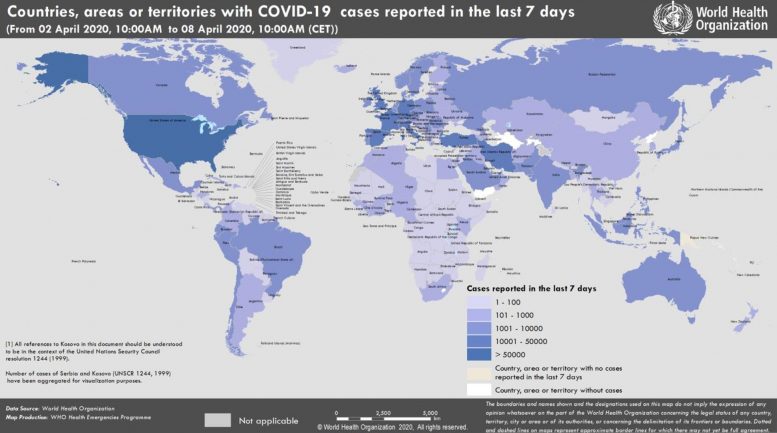
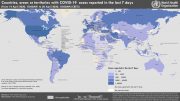
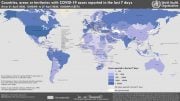
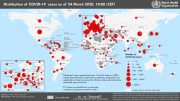
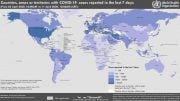
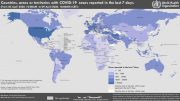
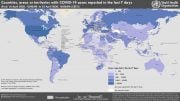
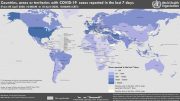
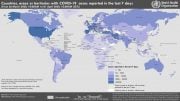
Be the first to comment on "Coronavirus World Map: 1,353,361 Confirmed Cases; 206 Countries; 73,639 Deaths"